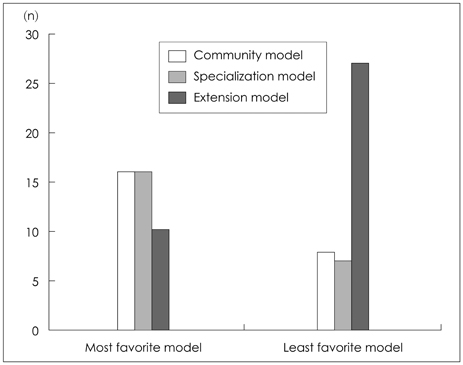J Korean Neuropsychiatr Assoc.
2014 Mar;53(2):99-113.
A Study to Investigate the Medium- and Long-Term Developmental Directions of Mental Hospitals
- Affiliations
-
- 1Department of Psychiatry, Yong-in Mental Hospital, Yongin, Korea. lilymh@gmail.com
- 2Department of Psychiatry, Seoul Metropolitan Eunpyeong Hospital, Seoul, Korea.
- 3Department of Mental Health Research, Seoul National Hospital, Seoul, Korea.
- 4Department of Psychiatry, Military Manpower Administration, Uijeongbu, Korea.
Abstract
OBJECTIVES
The aim of this study was to investigate medium- and long-term developmental directions of mental hospitals.
METHODS
The preliminary investigation is composed of unstructured interviews with 10 psychiatrists, literature and case investigations, and development of models for medium- and long-term developmental model. The qualitative investigation consisted of constructed interviews with seven professionals. The quantitative investigation was conducted using questionnaires, which were sent to members of the Korean Neuropsychiatric Association, etc. Data were analyzed using frequency analysis.
RESULTS
Through the preliminary investigation we were able to make three models : community model emphasizing linkage between mental hospitals and community, specialization model stressing specializations of mental hospitals, and extension model highlighting extensions of the roles of the mental hospital. In the qualitative investigation, two of the seven professionals gave a special preference for the community model, one for the specialization model, and two for the extension model. In the quantitative investigation, the community model and the specialization model were the most favorite models, and the extension model was the least favorite model.
CONCLUSION
Three developmental models could be used in planning of the medium- and long-term developmental directions of mental hospitals, although each model needs to be embodied in order to work in practice.
Figure
Reference
-
1. CNN selected Gonjiam mental hospital as one the most terrible 7 places in the world. Newdaily.co.kr [homepage on the Internet]. Seoul: Newdaily;updated 2012 Nov 12. Available from: http://www.newdaily.co.kr/news/article.html?no=129670.2. A bunch of unfair bargains between mental hospital and private emergency patient transfer were cracked down. Newsis.com [homepage on Internet]. Seoul: Newsis;updated 2012 Jun 25. Available from: http://www.ksilbo.co.kr/news/articleView.html?idxno=63459.3. Bargains between mental hospitals and private emergency patient transfer. Ksilbo.co.kr [homepage on the Internet]. Ulsan: Gyeongsang Ilbo;updated 2001 Jan 18. Available from: http://www.ksilbo.co.kr/news/articleView.html?idxno=63459.4. Salize HJ, Dressing H. Epidemiology of involuntary placement of mentally ill people across the European Union. Br J Psychiatry. 2004; 184:163–168.
Article5. A national report to protect and improve human rights of mentally disabled people. Seoul: National Human Rights Commission;2011.6. 2011 Project report of central community mental health support. Sejong: Ministry of the Health and Welfare;2011.7. Fakhoury W, Priebe S. Deinstitutionalization and reinstitutionalization: major changes in the provision of mental healthcare. Psychiatry. 2007; 6:313–316.
Article8. OECD health data 2013 definitions, sources and methods: psychiatric care beds in hospitals. Oecd.org [homepage on the Internet]. Paris: The Organisation for Economic Co-operation and Development;updated 2013. Available from: http://www.oecd.org/health/healthdata.9. Seoulmentalhealth.kr [homepage on the Internet]. Seoul: Seoul Mental Health Statistics;Available from: http://seoulmentalhealth.kr/about/trend1.jsp.10. OECD investigated state of mental health services in Korea "Extremely terrible". Docdocdoc.co.kr [homepage on the Internet]. Seoul: Young Doctor;updated 2013 Apr 9. Available from: http://www.docdocdoc.co.kr/news/newsview.php?newscd=2013040800034.11. Mental hospitals demanded a medical care assistance fee change from the case payment to the fee-for-services system. Docdocdoc.co.kr [homepage on the Internet]. Seoul: Young Doctor;updated 2011 Sep 16. Available from: http://m.docdocdoc.co.kr/newsview.php?newscd=2011091600003.12. Psychiatry demanded an improvement in medical care assistance fee in chorus. Healthfocus.co.kr [homepage on the Internet]. Seoul: Health Focus;updated 2013 Apr 12. Available from: http://m.healthfocus.co.kr/articleView.html?idxno=27659&menu=1.13. Human rights commission "Urgent need of an improvement in medical care assistance fee in mental hospitals". Koreahealthlog.com [homepage on the Internet]. Seoul: Korea Healthlog;updated 2009 Nov 9. Available from: http://www.koreahealthlog.com/news/newsview.php?newscd=2009110800005.14. Mental hospitals reel under a bankruptcy crisis due to the case payment of the past three years. Blog.daum.net [homepate on the Internet]. Seoul: Medigate;updated 2011 Oct 13. Available from: http://blog.daum.net/hira-qa/2522.15. Medical care assistance policy forced the director of a mental hospital to commit suicide. Healthfocus.co.kr [homepage on the Internet]. Seoul: Health Focus;updated 2013 Feb 12. Available from: http://www.healthfocus.co.kr/news/articleView.html?idxno=25721.16. The optimal mix of services for mental health. Who.int [homepage on the Internet]. Geneva: World Health Organization;update 2007. Available from: http://www.who.int/mental_health/policy/services/en.17. Top-ranked hospitals for psychiatry. Health.usnews.com [homepage on the Internet]. Washington, DC: U.S. News & World Report;updated 2013. Available from: http://health.usnews.com/best-hospitals/rankings/psychiatry.18. Mclean.harvard.edu [homepage on the Internet]. Belmont: McLean Hospital Hearvard Medical School Affiliate;Available from: http://mclean.harvard.edu.19. Menningerclinic.com [homepage on the Internet]. Houston: Menninger Clinic;Available from: http://www.menningerclinic.com.20. Sheppardpratt.org [homepage on the Internet]. Baltimore: Sheppard Pratt Health System;Available from: http://www.sheppardpratt.org.21. Austenriggs.org [homepage on the Internet]. Stockbridge: Austen Riggs Center;Available from: http://www.austenriggs.org.22. Park JI, Jang HS, Lee JS, Lee MS. A report of survey on the state of human rights: Structural causes and continuing factors of long-term hospitalization. Seoul: National Human Rights Commission;2008.23. Bearbetter.net [homepage on the Internet]. Seoul: Bear.Better;Available from: http://bearbetter.net/default/index.php.24. Tyrer P. Has the closure of psychiatric beds gone too far? Yes. BMJ. 2011; 343:d7457.
Article25. Bloom JD, Krishnan B, Lockey C. The majority of inpatient psychiatric beds should not be appropriated by the forensic system. J Am Acad Psychiatry Law. 2008; 36:438–442.
- Full Text Links
- Actions
-
Cited
- CITED
-
- Close
- Share
- Similar articles
-
- Child Psychiatry Perspectives on Developmental Disorders
- Physical symptoms, Hope and Family Support of Cancer Patients in the General Hospitals and Long-term Care Hospitals
- Improving Service Quality in Long-term Care Hospitals: National Evaluation on Long-term Care Hospitals and Employees Perception of Quality Dimensions
- The Role-expectations of Gerontological Nurse Practitioners and Performance of Gerontological Nursing by Nurses in Long Term Care Hospitals and General Hospitals
- Factors Affecting Supply of Mental Health Care Services in Korea




